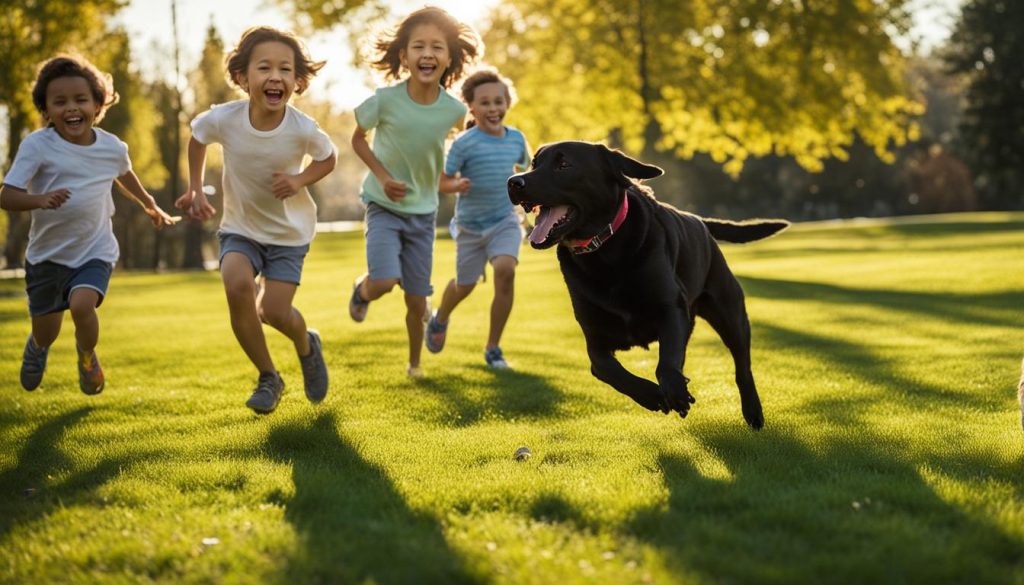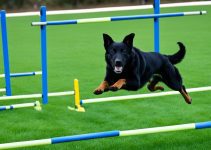I’m excited to share with you some effective Labrador Retriever training tips that will help you establish a happy and well-behaved relationship with your beloved furry friend. Labrador Retrievers are known for their amiable temperament and intelligence, making them highly trainable and eager to please.
When it comes to Labrador Retriever training, there are a few key areas to focus on. Obedience training is crucial, whether you decide to tackle it on your own or enroll in a training class. Labs respond well to positive reinforcement, so be sure to reward good behaviors with treats or playtime.
Another important aspect of Labrador Retriever training is socialization. Start early by introducing your Lab to different people, places, and situations in a positive and upbeat manner. This will help them become friendly and accepting towards strangers and new experiences.
Exercise is also a vital part of Labrador Retriever training. Labs are high-energy dogs that require at least an hour of exercise per day to prevent boredom and behavior problems. Regular exercise not only keeps them physically fit but also helps channel their energy in a positive way.
Lastly, don’t forget to provide behavioral management and mental stimulation for your Labrador Retriever. Crate training, interesting toys, and continued practice of basic commands are essential to keep them engaged and well-behaved.
With these Labrador Retriever training tips in mind, you can establish a strong bond with your four-legged companion while ensuring they grow up to be well-mannered and happy dogs.
Labrador Retriever Training
- Labrador Retrievers are highly trainable and eager to please.
- Obedience training using positive reinforcement is effective for Labs.
- Early socialization is important to develop friendly personalities.
- Labrador Retrievers require at least an hour of exercise each day.
- Providing behavioral management and mental stimulation is crucial for their well-being.
Socialization and Family Dynamics
When it comes to Labrador Retrievers, socialization plays a crucial role in shaping their personalities and behavior. Early socialization is key to ensuring that these dogs grow up to be friendly, accepting, and well-adjusted individuals. By introducing Labradors to new people, places, and experiences in a positive and upbeat manner, we can reinforce their natural tendency to be friendly and sociable with others.
However, it’s not just the dogs that need socializing – young children should also be introduced to Labrador Retrievers in a safe and supervised environment. Teaching children the boundaries and rules of interacting with their furry friends is essential to prevent any behavior problems or incidents. While Labradors are generally patient and tolerant, they may nip at a child who teases or hurts them during play. By setting clear boundaries and rules for both the children and the dog, we can ensure a harmonious and safe relationship.
Creating a loving and respectful bond between Labradors and young children is not only beneficial for their relationship but also helps cultivate empathy and compassion in children. It teaches them responsibility and respect for animals, while allowing them to experience the joy and companionship that these wonderful dogs bring into our lives.
Remember, socialization is an ongoing process that should continue throughout the dog’s life. By exposing them to different people, animals, and environments, we can help Labradors develop the necessary skills to navigate the world with confidence and ease.

Exercise and Energy Management
Labrador Retrievers are known for their high energy levels and require ample exercise to prevent boredom and behavior problems. It’s important to understand that Labrador Retrievers are not well-suited for apartment living due to their size and activity level.
To keep your Labrador Retriever physically and mentally stimulated, it’s recommended to provide them with at least an hour of exercise each day. This exercise can include activities such as long walks, jogging, swimming, or playing games of fetch. Regular exercise helps prevent destructive behavior, excessive barking, chewing, and digging, as well as promotes a well-behaved and happy Labrador Retriever.

Providing enough physical activity for your Labrador Retriever is crucial. It allows them to release their pent-up energy, reduce anxiety, and maintain a healthy weight. Additionally, exercise provides mental stimulation, which is important for preventing boredom-related behavior problems.
Remember to tailor the exercise routine to your Labrador Retriever’s individual needs, taking into account their age, health, and energy level. Consulting with a veterinarian or a professional dog trainer can help you establish an appropriate exercise plan for your furry friend.
Obedience Training and Positive Reinforcement
Labrador Retrievers are highly trainable and eager to learn. Starting an obedience program early is recommended to take advantage of their natural trainability. By teaching them basic obedience commands such as walking on a loose leash, recall, “drop it,” and “fetch,” you can ensure that your Labrador Retriever is well-behaved and under control.
Labrador Retrievers respond exceptionally well to positive reinforcement training methods. This approach involves rewarding good behaviors with treats, play, or affection. The use of positive reinforcement not only motivates your Labrador but also strengthens the bond between you and your furry companion.
Enrolling your dog in Labrador Retriever training classes is a great way to provide structured learning and socialization opportunities. These classes allow your Labrador to interact with other dogs and learn in a controlled environment under the guidance of experienced trainers.
Consistency and clear communication are essential when training Labrador Retrievers. They thrive in an environment where rules and expectations are clearly defined. By setting consistent boundaries and using clear cues, you can effectively communicate your desires to your furry friend.
Remember, Labrador Retriever training is an ongoing process that requires dedication and patience. The progress of your Labrador Retriever may vary, so it is important to remain consistent and persistent. With the right approach and plenty of positive reinforcement, you can shape your Labrador into a well-mannered and obedient companion.
The Benefits of Positive Reinforcement Training
Positive reinforcement training not only helps your Labrador Retriever learn obedience commands, but it also fosters a positive and trusting relationship between you and your dog. Here are some key benefits of positive reinforcement in Labrador Retriever training:
- Enhances your dog’s trainability and willingness to learn
- Promotes better behavior and reduces the likelihood of disobedience
- Strengthens the bond between you and your Labrador Retriever
- Boosts your dog’s confidence and self-esteem
- Provides mental stimulation and prevents boredom
- Creates a positive and harmonious living environment for both you and your pet
By using positive reinforcement techniques, you can ensure that your Labrador Retriever enjoys the training process and becomes a well-behaved and obedient companion.
Behavioral Management and Enrichment
Labrador Retrievers are known for their puppy-like energy and mischievous nature, which can persist even into adulthood. To ensure their safety and well-being when unsupervised, crate training is highly recommended. A crate provides a safe and controlled environment where they can relax and avoid getting into trouble.
Additionally, providing a variety of interesting toys and chews is essential for preventing boredom and destructive behavior. Labradors have a natural urge to chew, and offering them appropriate outlets for this behavior can save your furniture and shoes. Look for toys and chews that are durable, stimulating, and safe for your Lab to enjoy.
Continually practicing basic obedience commands is another crucial aspect of behavioral management for Labradors. Consistency in training and reinforcement of commands like sit, stay, and leave it will help keep your Labrador well-behaved and under control.
Incorporating mental stimulation activities into their daily routine is equally important. Labs are intelligent dogs that thrive on mental challenges. You can engage their minds by using interactive puzzle toys or playing scent games, which tap into their natural olfactory abilities.
- Crate training provides a safe and controlled environment for Labradors when unsupervised.
- Offer a variety of interesting toys and chews to prevent boredom and destructive behavior.
- Continually practice basic obedience commands to keep your Labrador well-behaved.
- Incorporate mental stimulation activities like puzzles and scent games for their overall well-being.
By keeping Labradors busy, mentally stimulated, and positively engaged, you can effectively manage their behavior and ensure their happiness and fulfillment.
Conclusion
Labrador Retrievers are highly trainable and versatile dogs that possess natural intelligence and a strong desire to please. Their eagerness to learn makes them excellent candidates for obedience training and various roles such as service animals or therapy dogs. By socializing them early and providing regular exercise, we can ensure their overall well-being and happiness.
Training programs, whether self-directed or with the help of a professional trainer, are essential in unlocking the Labrador Retriever’s full potential and ensuring good behavior. These intelligent dogs respond well to positive reinforcement training methods, where we reward them for their good behaviors. Whether it’s through treats, playtime, or affection, positive reinforcement reinforces their understanding of what is expected of them.
A well-trained and mentally stimulated Labrador Retriever will be a loving and well-behaved companion for any family. By nurturing their natural abilities and providing them with the necessary training and mental stimulation, we can further strengthen the bond between owners and their four-legged friends. The key to a happy and well-behaved Labrador Retriever lies in consistent training, positive reinforcement, and plenty of love and attention.
FAQ
Are Labrador Retrievers easy to train?
Yes, Labrador Retrievers are highly trainable and eager to please, making them relatively easy to train.
How much exercise do Labrador Retrievers need?
Labrador Retrievers are high-energy dogs and require at least one hour of exercise each day to prevent boredom and behavior problems.
What training methods work best for Labrador Retrievers?
Labrador Retrievers respond well to positive reinforcement training methods, which involve rewarding good behaviors with treats, play, or affection.
Should I enroll my Labrador Retriever in a training class?
Enrolling your Labrador Retriever in a training class is a great way to train them and socialize them with other dogs.
How can I prevent behavior problems in my Labrador Retriever?
Crate training, providing interesting toys, and continuing to practice basic commands can help prevent behavior problems in Labrador Retrievers.
Can Labrador Retrievers be used as service animals?
Yes, Labrador Retrievers are great candidates for service animal training and can excel in roles such as guide dogs or therapy dogs.






